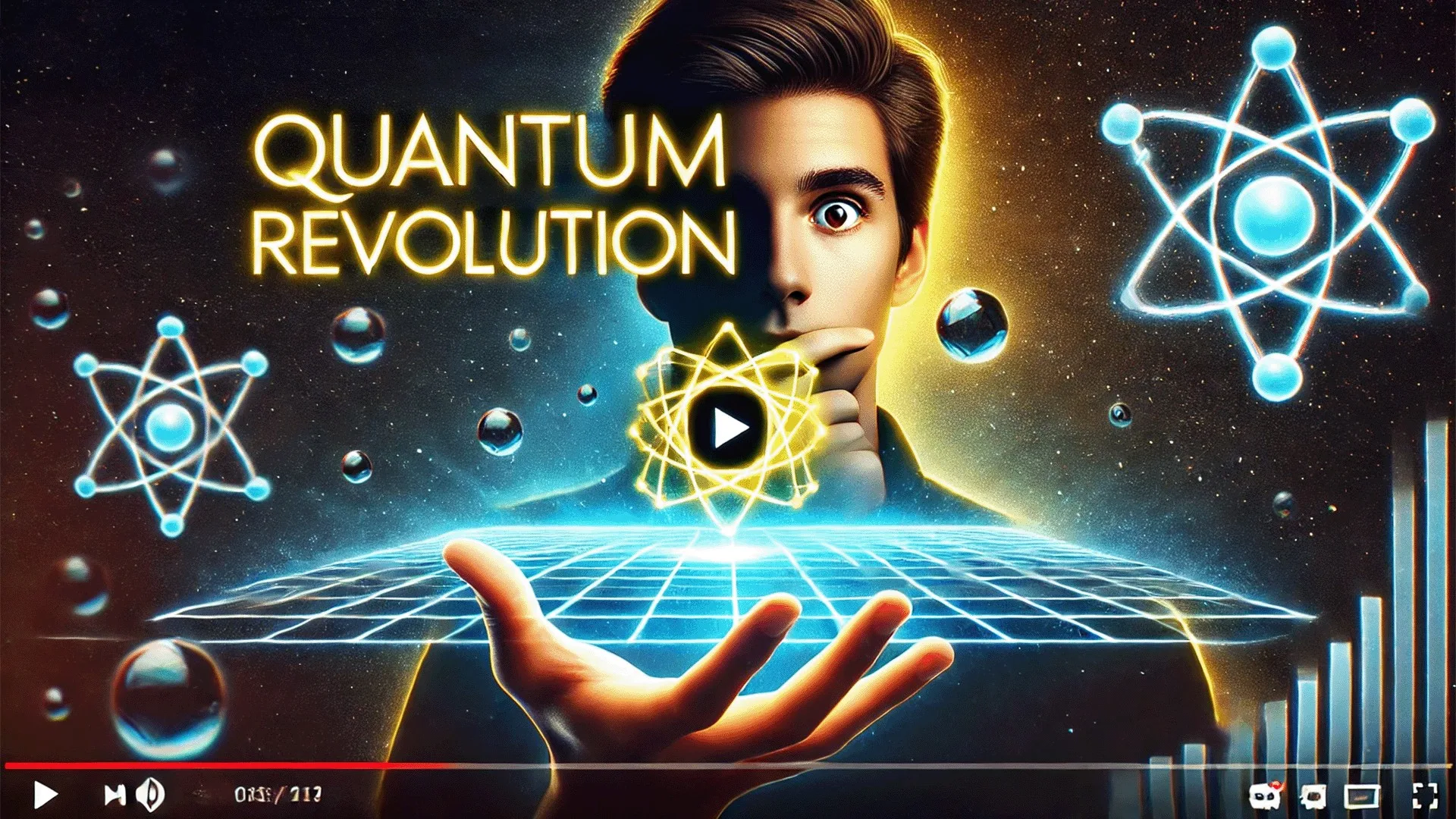Imagine you have a big pile of toy blocks in front of you. Each block has a color, either red or blue. Your task is to find one special blue bloc
Imagine you have a big pile of toy blocks in front of you. Each block has a color, either red or blue. Your task is to find one special blue block. You could pick up each block, one by one, and check until you find it. If you have hundreds or thousands of blocks, this process could take quite a while. Now, think of a regular computer as the person picking up those blocks one by one—doing this really, really fast but still one at a time.
Regular computers use tiny bits of information called “bits,” which function like little light switches. They can only be “off” (represented by 0) or “on” (represented by 1). This binary system is efficient for many tasks, but it limits how computers solve problems, as they can only check one potential solution at a time. Quantum computers, however, are different and operate in a way that sounds almost like magic.
What’s Special About Quantum Computers?
Now, imagine a super-cool magician who can look at all the blocks at once without picking them up. That’s similar to how a quantum computer works. Quantum computers use units called “qubits” instead of bits. The magic of qubits lies in their ability to exist in multiple states at once, thanks to a property called “superposition.”
Superposition Magic
Picture a superhero who can be in two places at the same time. A regular computer bit is like a superhero that can only be in one place—either saving a cat stuck in a tree or stopping a villain. A qubit superhero, on the other hand, can be in both places at the same time. This capability allows quantum computers to explore many possible solutions simultaneously, dramatically speeding up problem-solving for specific complex tasks.
Entanglement – The Super-Team Trick
But wait, there’s more! Quantum computers also use a phenomenon called “entanglement.” When two qubits become entangled, they form a super-team that always knows what the other is doing, even if they’re separated by great distances. If one qubit changes, the other one changes too, instantaneously, as if by magic. This feature allows quantum computers to carry out powerful calculations that would be impractical for regular computers.
How Quantum Computers Can Change the World
The potential of quantum computers is enormous, and their unique abilities could lead to groundbreaking solutions across various fields. Here are some areas where quantum computing could make a significant impact:
1. Better Medicines
Developing new medicines is a time-consuming and expensive process. Scientists must analyze countless chemical compounds and interactions to find ones that can effectively treat diseases. Traditional computers look at each possibility one at a time, which takes a lot of time. Quantum computers, with their ability to assess multiple possibilities at once, could revolutionize this process. Imagine having a super-fast treasure map that points out all the hidden treasures at once—quantum computers could make finding life-saving treatments much quicker and more efficient.
Send emails, automate marketing, monetize content – in one place
2. Solving Really Big Problems
Some problems are so complex that even the fastest supercomputers take years to solve them. For example, optimizing routes for hundreds of delivery trucks in a busy city or putting together a massive jigsaw puzzle with a million pieces can be daunting. A traditional computer approaches these problems piece by piece, while a quantum computer can evaluate many pieces simultaneously, piecing together the entire puzzle much faster.
3. Keeping Secrets Safe
Online security is crucial, as we rely on it to keep personal and financial information protected. Current encryption methods are strong, but as computing power grows, there is a risk that they could be cracked. Quantum computers could both pose a threat to traditional encryption and offer a solution by creating unbreakable encryption methods based on the principles of quantum mechanics. This would provide a virtually unbreakable way to keep information secure, much like a magical lock that no one can pick.
4. Helping the Environment
Quantum computers could play a vital role in finding solutions to pressing environmental challenges. They could simulate complex molecular interactions to discover new ways to harness renewable energy more efficiently. For instance, quantum computing might identify the best materials for solar panels or help develop technologies that use wind and water power more effectively. This would aid in reducing our reliance on fossil fuels and help protect the planet for future generations.
5. Making AI Smarter
Artificial intelligence (AI) has made remarkable progress in recent years, but there are still challenges that even the most advanced AI struggles with. Quantum computers can enhance AI by making it learn faster and solve more complex problems. It would be like upgrading a robot brain with the ability to think exponentially faster and solve puzzles more efficiently, boosting AI’s capabilities to unprecedented levels.
Why Aren’t Quantum Computers Everywhere Yet?
Despite their potential, quantum computers are not widespread yet. The main reason is that they are incredibly delicate. Qubits need to be kept extremely cold—colder than outer space—to maintain their superposition and entanglement. Additionally, they require complex and costly machinery to prevent them from interacting with their surroundings, which would disrupt their quantum state, similar to trying to keep a soap bubble from popping.
Overcoming the Challenges
Scientists and engineers are continually working on ways to make quantum computers more stable and practical for everyday use. This includes developing error-correcting codes and new methods to keep qubits in a stable state for longer periods. Progress is being made, and the hope is that as technology advances, quantum computers will become more accessible and integrated into various fields, much like traditional computers are today.
Quantum Computers and AI – The Superhero Team
Think of quantum computers and AI as a dream team of superheroes, each with unique abilities. Quantum computers are the super-fast thinkers that can look at many possible answers simultaneously, while AI is the smart decision-maker that learns and improves over time. When these two team up, they can tackle challenges that were previously impossible.
How Quantum Computing Helps AI
Learning Super Fast
AI systems are good at learning, but they still require time to process and adapt. This is akin to teaching a dog a new trick, which takes repeated practice. Quantum computers can change this by allowing AI to evaluate many potential learning paths simultaneously, dramatically speeding up the training process. This would be like having a super-teacher that could teach a dog all its tricks in one day instead of weeks.
Solving Hard Puzzles
AI can already solve many problems, but some puzzles are so difficult that even advanced AI systems struggle. Quantum computers can assist by examining all the pieces of a puzzle at once, enabling AI to find optimal solutions quickly. This would mean faster route planning for delivery services or better optimization for supply chain logistics, significantly boosting efficiency.
Making AI Smarter
Quantum computing can help AI explore possibilities and think in novel ways by leveraging superposition. Imagine playing a complex strategy game where you need to make the best move. Quantum computers can help AI analyze all potential moves simultaneously, improving its ability to make the best choice. This could make AI better at games, decision-making, and even assisting in research.
Finding Patterns
AI is excellent at recognizing patterns in large data sets, but this process can be time-intensive. Quantum computers can make this faster by analyzing multiple patterns at once. This ability could be harnessed for applications such as identifying genetic markers for diseases or improving weather forecasts, making AI a powerful tool for industries that rely on data analysis.
Why Quantum Computing and AI Together is Really Good
1. Better Healthcare
When AI and quantum computing join forces, they can revolutionize healthcare. AI already assists doctors in diagnosing diseases and planning treatments, but quantum computing can take this further by sifting through vast amounts of medical data at lightning speed. This means doctors could get more accurate recommendations on which treatments to use, leading to better patient outcomes.
2. Improving Technology
AI is integral to the technology we use every day, from smartphones to smart home devices. With quantum computing, AI could become even more powerful, potentially creating new forms of technology that we haven’t yet imagined. This partnership could lead to smarter, more adaptive tech that can better understand and anticipate our needs.
3. Fighting Climate Change
Quantum computers can empower AI to model and predict complex environmental changes, finding more effective ways to combat climate change. For example, they could simulate how various energy sources impact the environment or find optimal ways to reduce carbon emissions. This partnership could lead to innovative solutions for preserving ecosystems and promoting sustainable practices.
4. Solving World Problems
Feeding the global population, ensuring clean water access, and addressing large-scale infrastructure needs are immense challenges. Quantum computing, combined with AI, could analyze countless potential solutions in real time and suggest the most effective approaches. This could lead to breakthroughs in food distribution, water purification, and urban planning.
5. Making Life Easier
From planning your daily schedule to designing better public transportation systems, the combination of quantum computing and AI could enhance our quality of life. Imagine an AI that helps you avoid traffic jams by predicting the best routes or one that suggests the most efficient time to shop based on crowd data. The possibilities are vast and exciting.
What’s Next for Quantum Computing and AI?
Scientists and engineers are in a race to unlock the full potential of quantum computing and integrate it with AI. It’s like training a superhero team to work seamlessly together. As technology progresses, we’ll see more sophisticated quantum computers and AI systems that complement each other, leading to innovations that could change the world.
The Future is Bright
In summary, quantum computing and AI are like two superheroes with complementary strengths. Quantum computers offer unparalleled processing power, capable of considering multiple possibilities at once, while AI provides the learning and decision-making abilities that can benefit from this power. Together, they can solve complex problems, improve healthcare, advance technology, fight climate change, and make life easier for people around the globe.
Send emails, automate marketing, monetize content – in one place


